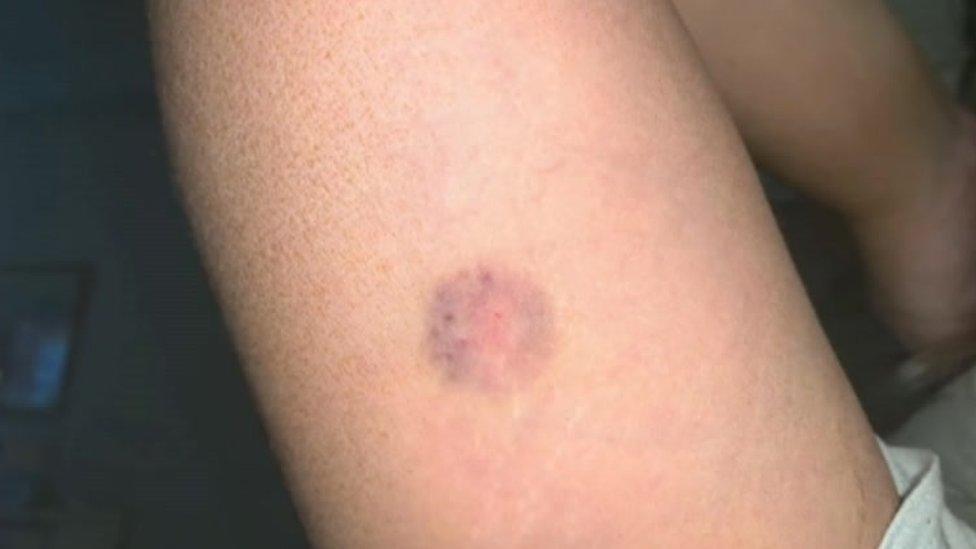Spiked Gloucester student backs MP to make act a crime
- Published

Maisy Farmer was spiked with a needle during a night out in Worcester
A student who was spiked in the arm using a needle is backing her MP's campaign to make the act of spiking a specific criminal offence.
Maisy Farmer, 20, from Gloucester, suffered the ordeal during a night out in Worcester in December and said she was left "manic and shaking".
New legislation proposed by Gloucester MP Richard Graham would make spiking a specific offence.
While current laws can be used to prosecute, not all incidents apply.
Miss Farmer said she noticed the puncture wound on her arm following a night out when she had felt extremely unwell and eventually passed out, despite not having had much to drink.
She recognised the mark on her arm as needle spiking and contacted 111.
"I got seen by a triage nurse and she basically asked me where I'd been and she said 'yeah, we've had quite a few girls come in from there saying they'd been spiked'", Miss Farmer said.
Cases of spiking, particularly using a needle, have become more prevalent in recent months.
'Deeply unpleasant impact'
More than 100 reports of spiking have been made to police in Gloucestershire since September but the vast majority have not led to convictions.
Spiking a drink is illegal and the maximum sentence, if found guilty, is 10 years in prison.
However, it is not a specific criminal offence, something MP Richard Graham said had to change.
Speaking in the Commons on Wednesday he shared Maisy's story to explain the importance of the bill.

Miss Farmer felt extremely unwell during a night out in Worcester and then noticed the puncture wound on her arm
"We can all send a clear message, above all, to those who think that spiking is fun; it is not.
"Spiking has a deeply unpleasant impact to many lives and it is, I argue, a crime that should be punishable in its own right", Mr Graham said.
Additional government funding has already been given to police forces to help tackle the issue.
Gloucestershire Constabulary secured more than £1m from the Safer Streets Fund in October to help protect women and girls in the county.
It allowed the force to buy more urine testing kits for suspected spiking cases as well as invest in prevention and education work.
'Really harms people'
Miss Farmer's case remains under investigation and she is also undergoing regular blood tests for hepatitis and HIV and has started precautionary hepatitis injections too.
She said: "I just feel at the minute that no-one's taking it seriously, everyone's saying, 'oh I've been spiked', like it's a normal thing.
"Until there's proper law change and people realise like doing this isn't just funny, it really harms people, it needs to be done."
The spiking bill has received cross party support in the Commons and is due to have its second reading in March.
- Published5 November 2021

- Published12 November 2021

- Published20 October 2021

- Published20 October 2021

- Published6 December 2018
